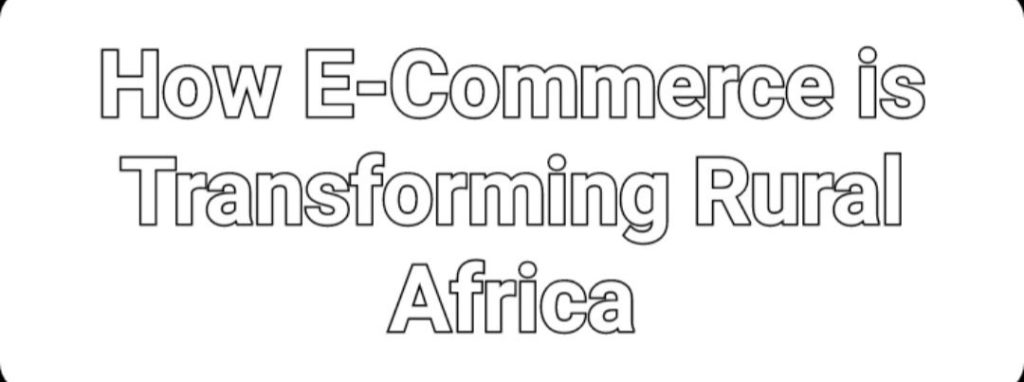How E-Commerce is Transforming Rural Africa
In recent years, the rise of e-commerce has been reshaping economies and societies across the globe. While much of the focus has been on urban centers and developed markets, one of the most profound transformations is quietly taking place in rural Africa. E-commerce is not just a convenience for these communities; it is a powerful tool for economic empowerment, social inclusion, and sustainable development. Here’s how e-commerce is transforming rural Africa and unlocking new opportunities for millions.

1. Bridging the Urban-Rural Divide
For decades, rural communities in Africa have faced significant challenges in accessing goods and services. Limited infrastructure, poor road networks, and a lack of physical retail stores have made it difficult for rural residents to access essential products, from farming equipment to healthcare supplies. E-commerce platforms are bridging this gap by connecting rural consumers with sellers across the country and even internationally. With just a smartphone and an internet connection, rural Africans can now order products and have them delivered to their doorstep, reducing the need to travel long distances.
2. Empowering Local Entrepreneurs
E-commerce is not just about consumption; it’s also about creation. Platforms like Jumia, Kilimall, and Shopify are enabling rural entrepreneurs to reach a wider market. Farmers, artisans, and small business owners can now sell their products online, bypassing traditional middlemen and earning better profits. For example, a farmer in Kenya can sell fresh produce directly to consumers in Nairobi, while a craftswoman in Ghana can export her handmade goods to buyers in Europe. This democratization of trade is empowering rural communities and fostering economic self-reliance.
3. Boosting Agricultural Productivity
Agriculture is the backbone of many rural African economies, yet farmers often struggle with access to markets, fair pricing, and modern tools. E-commerce platforms are revolutionizing the agricultural sector by connecting farmers with buyers, suppliers, and resources. Platforms like Twiga Foods in Kenya and AgroCenta in Ghana allow farmers to sell their produce directly to retailers and consumers, ensuring fair prices and reducing post-harvest losses. Additionally, farmers can use e-commerce to access affordable seeds, fertilizers, and equipment, improving productivity and sustainability.
4. Financial Inclusion Through Digital Payments
One of the biggest barriers to e-commerce adoption in rural Africa has been the lack of access to formal banking services. However, the rise of mobile money platforms like M-Pesa, Airtel Money, and MTN Mobile Money has changed the game. These digital payment systems allow rural consumers and businesses to participate in e-commerce without needing a traditional bank account. Mobile money has become the lifeblood of rural e-commerce, enabling seamless transactions and fostering trust in online marketplaces.
5. Creating Jobs and Reducing Poverty
The growth of e-commerce in rural Africa is creating new job opportunities, particularly for young people. From delivery drivers and warehouse workers to digital marketers and customer service representatives, e-commerce is generating employment in areas where jobs are scarce. Additionally, by providing rural entrepreneurs with access to larger markets, e-commerce is helping to lift communities out of poverty and reduce income inequality.
6. Overcoming Challenges
While the potential of e-commerce in rural Africa is immense, there are still challenges to overcome. Limited internet connectivity, high data costs, and logistical hurdles in last-mile delivery remain significant barriers. However, initiatives like Google’s Project Loon, SpaceX’s Starlink, and local innovations in drone delivery are gradually addressing these issues. Governments and private sector players are also investing in infrastructure and digital literacy programs to ensure that rural communities can fully participate in the digital economy.
7. A Catalyst for Sustainable Development
E-commerce is more than just a business model; it’s a catalyst for sustainable development in rural Africa. By providing access to markets, resources, and opportunities, e-commerce is helping to achieve the United Nations Sustainable Development Goals (SDGs), including no poverty, zero hunger, and decent work and economic growth. Moreover, by reducing the need for physical travel and promoting local production, e-commerce is contributing to environmental sustainability.
The Future of E-Commerce in Rural Africa
The transformation of rural Africa through e-commerce is still in its early stages, but the potential is enormous. As internet penetration increases, mobile technology advances, and logistics networks expand, e-commerce will continue to empower rural communities and drive inclusive growth. So The key to success lies in collaboration between governments, businesses, and communities to address challenges and create an enabling environment for e-commerce to thrive.
In the coming years, we can expect to see even more innovative solutions tailored to the unique needs of rural Africa. From AI-powered marketplaces to blockchain-based supply chains, the possibilities are endless. E-commerce is not just changing the way rural Africans buy and sell; it’s changing their lives for the better.
Conclusion
E-commerce is proving to be a game-changer for rural Africa, unlocking new opportunities and transforming communities in ways that were once unimaginable. By bridging the gap between rural and urban areas, empowering local entrepreneurs, and fostering sustainable development, e-commerce is paving the way for a brighter future. As the digital revolution continues to unfold, rural Africa is no longer on the sidelines—it’s at the forefront of innovation and progress. So The story of e-commerce in rural Africa is just beginning, and it’s a story of hope, resilience, and transformation.